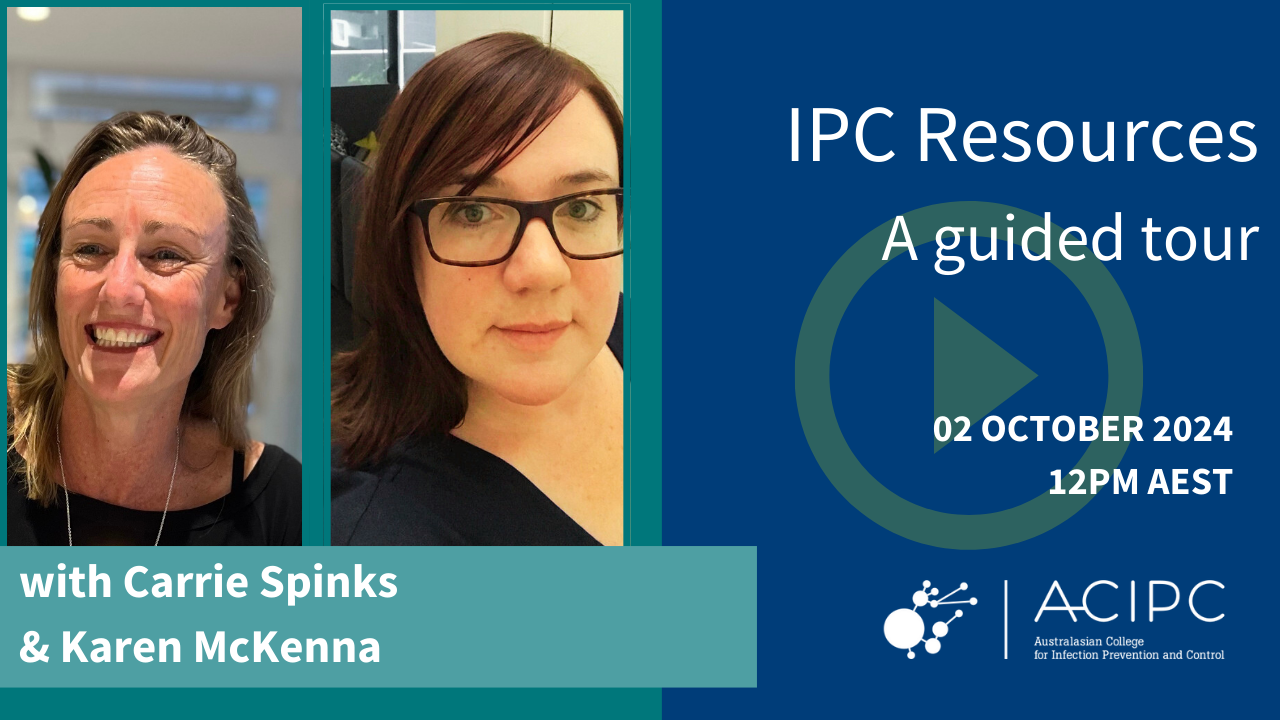Lunch and Learn Webinars
ACIPC offers free online webinars on IPC topics of interest, with interesting and experienced presenters from a wide range of disciplines.
Members can view recordings of our webinars here:
https://www.acipc.org.au/members/webinars/
Recent Lunch and Learn webinars

Topic: IPC in rural and regional hospitals: Establishing an easy-to-follow priority checklist for the IPC National Standard 3
Presenter: Mary-Clare Smith
Description: The rural and remote settings face big challenges for IPC. Our speaker Mary-Clare Smith, District Infection Prevention and Control CNC – Murrumbidgee LHD New Sout Wales, is the IPC Lead for 31 facilities, a substantial proportion of which have no IPC designated IP Lead or formal position for the role. This reality is the core reason behind the idea of developing a concise, hands-on tool designed to monitor key aspects of infection prevention and control at the floor level. This tool aims to streamline governance and emphasise IPC principles in rural and remote sites, addressing the critical needs of these unique environments
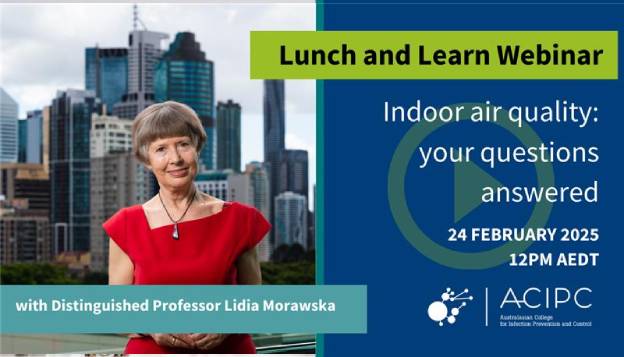
Topic: Indoor Air Quality: Your questions answered
Presenters: Distinguished Professor Lidia Morawska
Description:
Our September 2024 webinar ‘Indoor Air Quality: Science, Practice, Legislation’ was a big success. Thank you to all those who attended, and as there were so many great questions and not enough time to answer them all, we are delighted to announce that Distinguished Professor Lidia Morawska will present this follow-up webinar. She’ll be answering those questions; if time permits, you’ll have the chance to pose new ones to her. Join us for an even deeper dive into this fascinating and important topic.
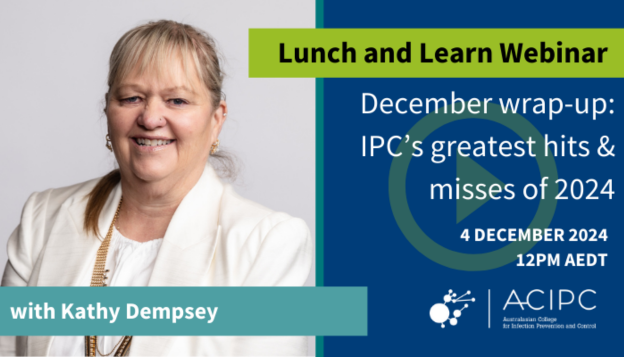
Topic: December wrap-up: IPC’s greatest hits % misses of 2024
Presenters: Kathy Dempsey
Description:
The last year has seen many of our pandemic structures and strategies retired however Infection Prevention and Control has continued to work tirelessly towards keeping our patients, staff and broader community safe. 2024 has been another very busy year for IPC. Whilst many have moved on from the pandemic, IPC continue to stand up and provide support to our systems often overwhelmed with historical infections, new infections, novel infections and even some making a comeback. All whilst incorporating COVID-19 into our business as usual models. The “December wrap-up: IPC’s greatest hits and misses of 2024” will be a presentation to celebrate Infection Prevention and Control, an opportunity to reflect and acknowledge the great work of our community.
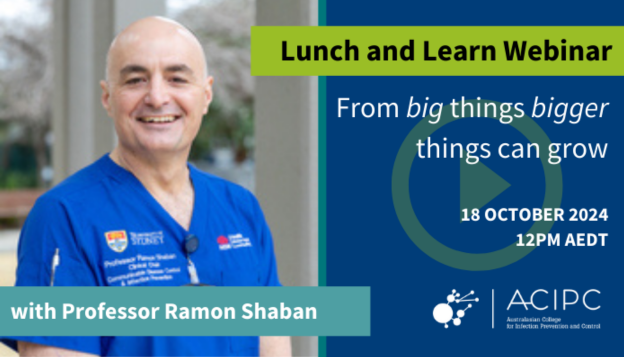
Topic: From big things bigger things can grow
Presenters: Professor Ramon Shaban
Description:
The COVID-19 global pandemic was arguably the most significant event for infection control practitioners globally in modern times. It brought with it unimaginable challenges and difficulties, forcing us to think differently in the most testing of circumstances. It was ‘big’, and during the height of the public health emergency phase it was hard to see how anything could have been bigger. But the pandemic also offered (and still offers) opportunities that were once considered unimaginable—to manifest other big opportunities once considered impossible. This presentation showcases one such success story. It details how seizing and manifesting opportunities from the pandemic led to the establishment of a ground-breaking body of work that is moving the needle for infection control practitioners and our profession and some of the most vulnerable patients, and communities we serve.
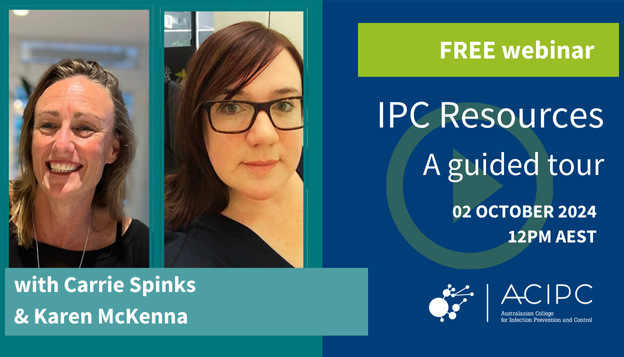
Topic: IPC Resources: A guided tour
Presenters: Karen McKenna and Carrie Spinks
Description:
In this webinar, we explore our full range of online courses, resources, templates, handy links to government information and regulations (Australia, New Zealand and Pacific region), webinars, and more.
We look at IPC resources specific to a wide variety of areas, such as acute, aged care, allied health, veterinary, dental, mental health, office-based, consumers, pharmacists, and beauty and body art.
The webinar also shows you how to find information about our position statements, scholarship and research grant opportunities, free publications such as IPC News, and the credentialling process.
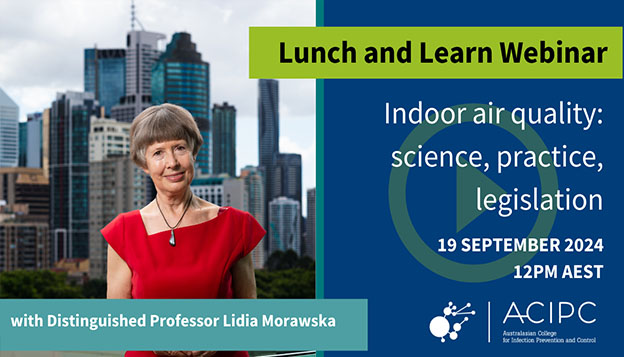
Topic: Indoor Air Quality: Science, Practice, Legislation
Presenter: Distinguished Professor Lidia Morawska
Description:
Despite decades of effort by many experts and a wealth of evidence about the magnitude of the problem, the issue of indoor air quality (IAQ) in public buildings, including healthcare facilities, has attracted little attention. Indoor air pollution originates from both indoor and outdoor sources. In addition to sources that people operate indoors (including medical procedures in healthcare facilities), create or introduce to indoor environments, emissions also arise from humans in the form of respiratory effluents (including pathogens and therefore increased risk of infection transmission) and body odours. Unlike outdoor air, indoor air is largely unregulated; while national building design standards prescribe ventilation parameters, and emissions from certain building materials in certain countries are regulated, there are basically no IAQ performance standards. In the absence of standards, what can we practically do to improve IAQ? When deciding on actions, several general aspects must be considered. Firstly, every indoor space is different, so monitoring needs to be conducted in every public indoor space. Secondly, we cannot use bulky and expensive compliance monitors for every indoor space. And thirdly, pathogens related to indoor airborne infection transmission cannot yet be routinely monitored indoors in real-time. Therefore, we must carefully choose what to monitor, balancing the need to gather information on pollutants that are key health risks or their proxies, but also considering which pollutants can realistically be measured to provide information on IAQ based on existing technologies; and in the future – for compliance with IAQ standards.
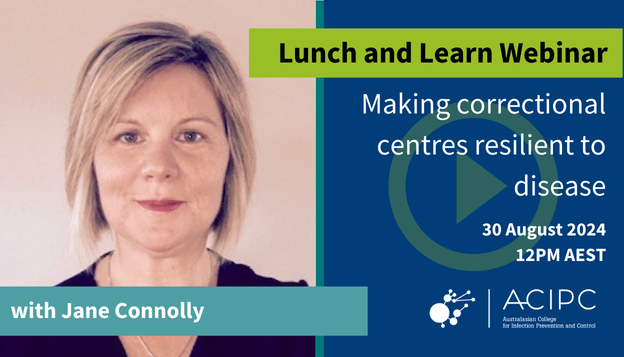
Topic: Making correctional centres resilient to infectious diseases and communicable disease outbreaks
Presenter: Jane Connolly
Description:
Learn about infection prevention and control in the custodial setting. Public health approaches and key fundamental principles of infection prevention and control remain the mainstay of patient safety and outbreak management in prisons.
Correctional centre environments and their populations are located across all of NSW, geographically within other local health districts (LHDs), and present a particular set of challenges for infection prevention and communicable disease control.
Populations in custody are known to have an over-represented burden of disease compared to the general population, including higher rates of comorbidity, and infectious and transmissible disease. Given the high level of vulnerability of the prison population, COVID-19 and all other communicable diseases pose a serious risk to the health outcomes of prisoners and the wider population. The global COVID-19 pandemic has provided opportunities for further strengthening of infection prevention and communicable disease control strategies, thereby helping to ensure that this high-risk population is more resilient to infectious disease transmission and outbreaks in the future.
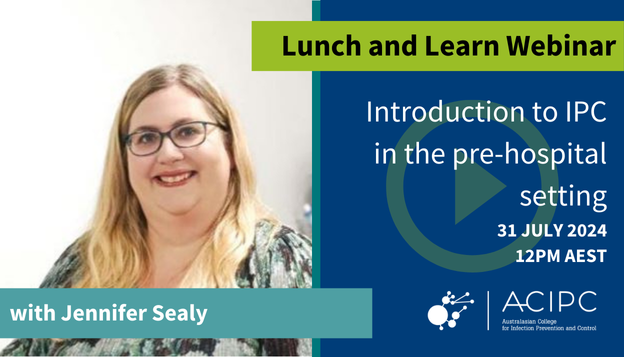
Topic: Introduction to IPC in the pre-hospital setting
Presenter: Jennifer Sealy
Description:
This presentation covers some of the hot topics in the IPAC pre-hospital care space and how they may differ to the hospital space.

Topic: How to write a successful research grant
Presenter: Amanda Corley
Description:
Learn how to increase your chances of success when writing a research grant. Get some quick tips on how to craft a grant proposal which is clear, compelling, appeals to the funder and sets you up for success. This session will be particularly useful for anyone considering applying for the ACIPC Seed or Early Career Researcher grants which are currently open to ACIPC members.
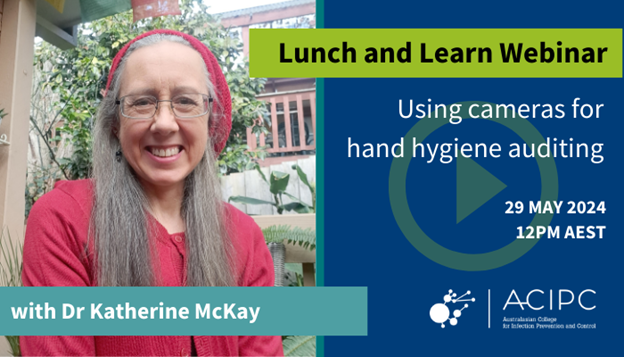
Topic: Using cameras for hand hygiene auditing – opening a ‘Pandora’s box or worms; and completing a PhD to boot
Presenter: Dr Katherine McKay
Description:
Direct observation is the mandated method for collecting data about health care worker (HCW) hand hygiene compliance in Australia. Yet the approach has been criticised as being a time consuming way of collecting compliance rates which do not reflect practice the majority of the time. Various electronic approaches have been suggested as solutions to the ‘problems’ associated with direct observation, however a deep dive into the literature revealed that most rely on proxy measures of compliance rather than measuring practice according to the 5-moment framework. This presentation describes the results of a PhD study which explored the utility of video monitoring systems (VMS) for hand hygiene auditing. It outlines the potential for positive benefits as a results of the use of VMS and well as identifying barriers to implementation and areas for future investigation. A pitfall of any investigation is the myriad of other ideas, concepts and themes which emerge which, while interesting, are not strictly relevant to the study at hand. One of these rabbit holes, tempting to divert down, was the purpose and intent behind the act of direct observational auditing. It is this, ‘Pandora’s box of worms’ that will also be opened and shared along with the results described in the final PhD thesis.
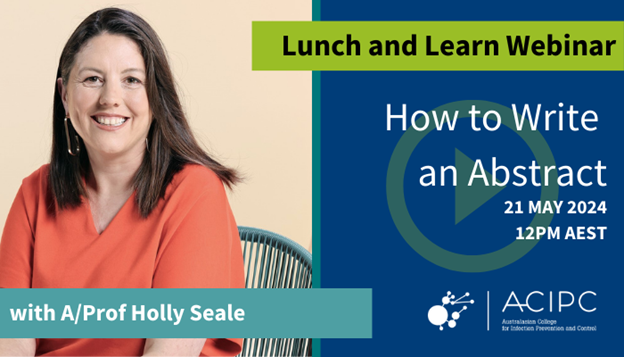
Topic:– How to write an abstract
Presenter: A/Prof Holly Seale
Description:
Learn how to create clear, concise, and compelling summaries that capture the essence of your research. This session will cover essential elements, from structuring your abstract to choosing impactful words. Open to anyone considering submitting an abstract to the 2024 ACIPC Conference or an international infection prevention and control conference.
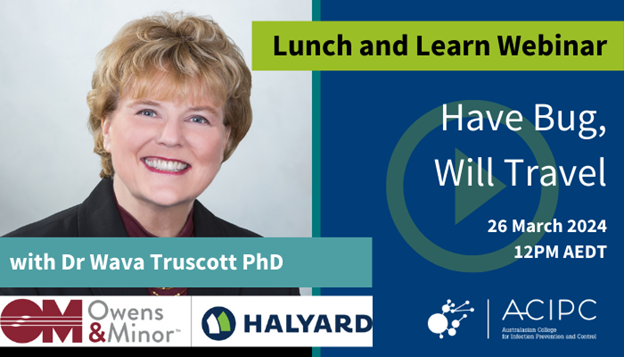
Topic: Have Bug, Will Travel: Pathways to Infection and Prevention
Presenter: Dr Wava Truscott PhD
Description:
In this edition of our Lunch and Learn series we were joined by Dr. Wava Truscott PhD. Dr. Truscott is founder of Truscott MedSci Associates, a consulting company focusing on current concerns in healthcare including infection prevention, improved patient outcomes, and staff risk reduction. These goals are addressed, by developing educational courses, speaking engagements, authoring articles, and assisting with experimental design.
This webinar was brought to you by ACIPC, Owens & Minor and Halyard.
Note: CPD points were available only for those who participated in the live session.
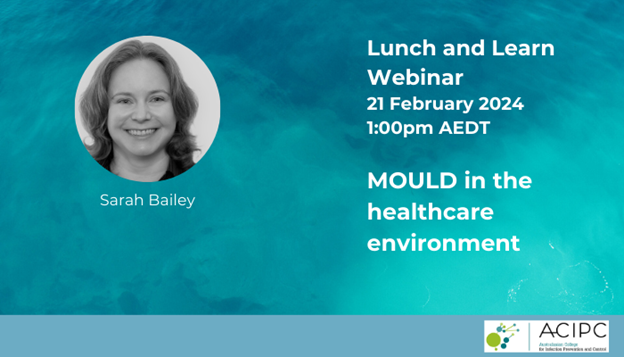
Topic: Mould in the Healthcare Environment
Presenter: Sarah Bailey
Description:
This Lunch & Learn session is an introduction to mould in the healthcare environment, how it gets there, and what you can do about preventing it and getting rid of it, and also appropriate responses to it in healthcare, based on risks to patients.
